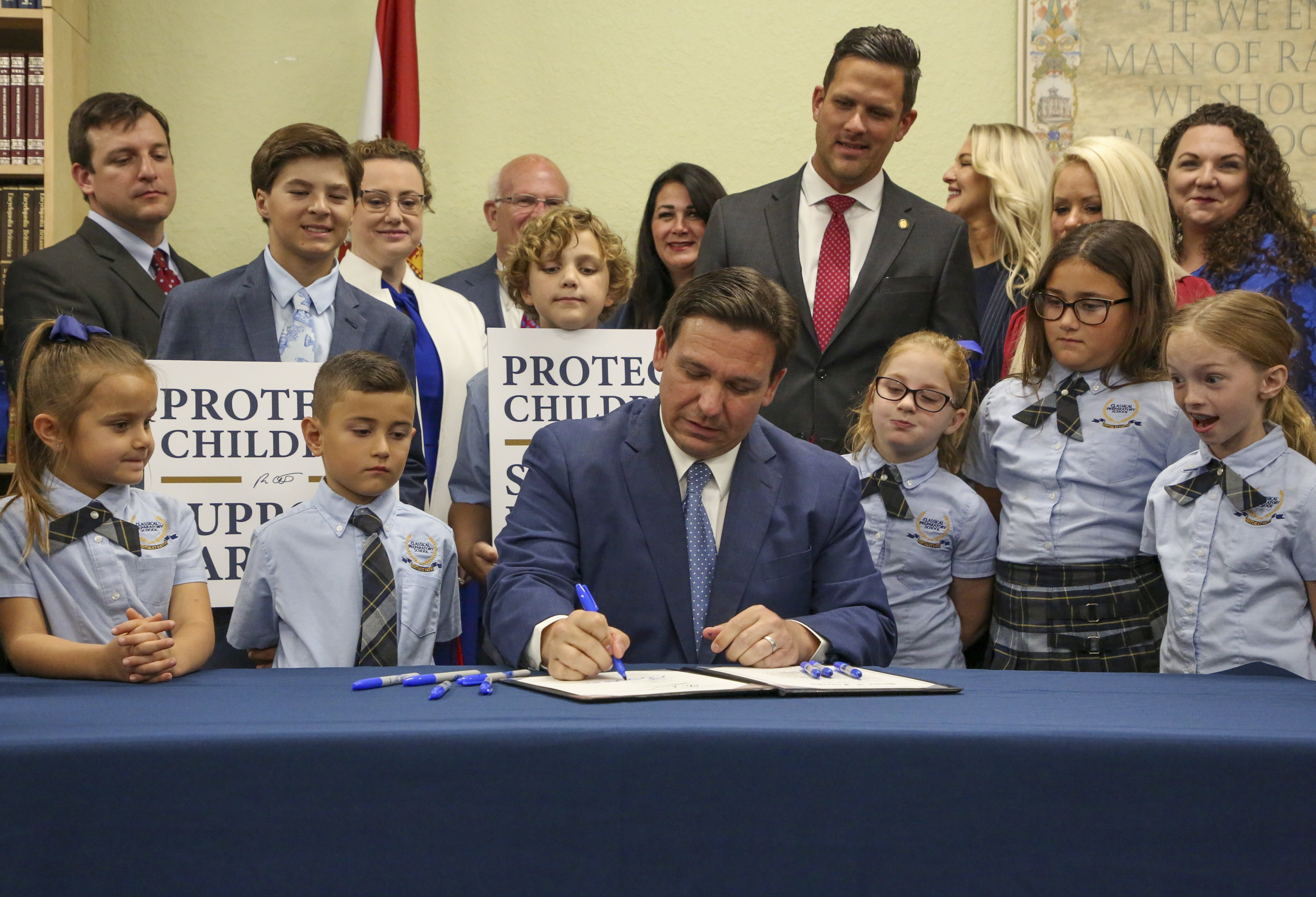Settlement in Florida 'don't say gay' lawsuit says it's okay to say gay

Florida Gov. Ron DeSantis signs the Parental Rights in Education bill, otherwise known as the "Don't Say Gay” law, in March 2022 in Shady Hills, Florida. (Douglas R. Clifford/Tampa Bay Times via AP)
A lawsuit settlement over Florida’s “don’t say gay” statute announced Monday affirms that teachers and students can discuss LGBTQ issues and have access to related library books, largely canceling many of the impacts of the signature legislation from Gov. Ron DeSantis (R).
The settlement was immediately praised by rights groups who said it marked a major victory for LGBTQ students, teachers and families who were effectively barred from speaking about their own personal lives or loved ones in same-sex relationships.
“Florida has already endured nearly two years of book banning, educators leaving the profession, and safe space stickers being ripped off of classroom windows in the wake of this law cynically targeting the LGBTQ+ community,” Equality Florida Executive Director Nadine Smith said in a statement. “This settlement is a giant step toward repairing the immense damage these laws and the dangerous political rhetoric has inflicted on our families, our schools, and our state.”
Under the terms of the settlement, the law itself remains in place but the state must clarify that it “restricts only classroom instruction on particular subjects—‘sexual orientation’ and ‘gender identity,” but does not restrict “the mere discussion of them.” The law also cannot be applied to library books, a number of which had been banned.
The state Board of Education is now required to send instructions detailing the settlement requirements to all of Florida’s 67 school districts. Parents and LGBTQ groups sued over the Parental Rights in Education Law in April 2022.
The DeSantis administration described the settlement as “a major win,” because prohibiting instruction on sexual ideology in public school classrooms remains in place. But critics have long asserted that little on the subject was actually taught in school and that the most consequential effects of the law were how much fear it caused over any mention of LGBTQ people in classrooms.
The former GOP presidential contender championed the law as his way of “standing up for parents.” He decried what he called “woke indoctrination” in schools, and said the state had a responsibility to protect children from having “woke gender ideology injected into the curriculum.”
“That is inappropriate, that’s not what we want in our school system,” DeSantis said after signing the law in 2022.
Opponents of the law said it was vaguely written, which led to most school districts in the state interpreting it to mean that discussion and symbols of LGBTQ subjects—such as rainbow flags—were forbidden. Teachers were advised to remove photos of family members if they reflected a same-sex relationship, and student groups such as gay-straight alliances were canceled. At least one school district dropped its anti-bullying lessons because some of the scenarios involved gay students.
The law carries penalties that include suspending or removing teaching certificates, and opens schools to lawsuits from parents who feel teachers are violating it. Legislators expanded it in 2023 to cover all grades; attorneys said Monday the settlement covers all grades as well.
Educators in the state said classes on gender ideology were not being taught in elementary schools, but supporters of the law said things such as safe space stickers and books depicting LGBTQ relationships were part of the indoctrination DeSantis wanted to eliminate.
Opposition to what was quickly dubbed the “Don’t Say Gay Law” came from President Biden, who called it “hateful,” and others, including the former CEO of the Walt Disney Company.
After Disney criticized the law and vowed to fight it, DeSantis instructed lawmakers to look into dismantling Disney’s 50-year-old special taxing district. The GOP-led legislature passed a law dissolving the Disney board, and while Disney sued, a court recently upheld the law. A board of DeSantis appointees is now running the district.
DeSantis sharply criticized not only Disney, but other critics of the law. In Monday’s statement declaring the settlement a win, the governor’s office said “Governor Ron DeSantis stood up to activists and extremists who mobilized to smear and stop” the law.
“We fought hard to ensure this law couldn’t be maligned in court, as it was in the public arena by the media and large corporate actors,” DeSantis’s general counsel Ryan Newman said in a statement. “We are victorious, and Florida’s classrooms will remain a safe place under the Parental Rights in Education Act.”
But others see it as a victory instead for teachers and LGBTQ families. One of the fiercest points of contention over the law’s implementation involved library books. Titles like “And Tango Makes Three,” which tells the story of two male penguins who create a family together, were challenged and in some cases withdrawn from library shelves. The settlement could nullify those challenges.
“For years, the DeSantis administration refused to clarify their vague and punitive law, which led to the removal of library books that included LGBTQ people, censorship of classroom discussions about our existence, and an exodus of teachers from the profession, both gay and straight,” said former state Rep. Carlos Guillermo Smith, who voted against the law when he was in the state House. “This doesn’t undo the tremendous harm already caused by this hateful law, but it’s a big step towards repairing the damage.”



